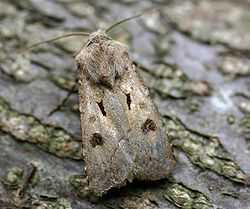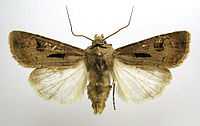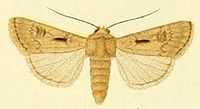Heart and Dart
| Heart and Dart | |
|---|---|
 | |
| Scientific classification | |
| Kingdom: | Animalia |
| Phylum: | Arthropoda |
| Class: | Insecta |
| Order: | Lepidoptera |
| Family: | Noctuidae |
| Genus: | Agrotis |
| Species: | A. exclamationis |
| Binomial name | |
| Agrotis exclamationis (Linnaeus, 1758) | |
| Synonyms | |
| |
The Heart and Dart (Agrotis exclamationis) is a moth of the family Noctuidae. A familiar moth to many, it is considered one of the most common of the European region. It occurs throughout the Palearctic ecozone from Ireland to Japan.



This is a quite variable species, forewings ranging from pale to dark brown but always recognizable by the distinctively shaped dark stigmata which give it its common name. The hindwings are whitish (compared with other common Agrotis species the hindwings of this species are usually paler than in Heart and Club but darker than in Turnip Moth). The wingspan is 35–44 mm. This species usually has a dark area at the front of the thorax, visible as a horizontal bar when viewing the moth head-on. This moth flies at night from May to July and is attracted to light, sometimes in large numbers. It also frequently visits nectar-rich flowers such as Buddleia, ragwort and Red Valerian.
The larva is brown above and grey below and feeds on a variety of plants, both wild and cultivated (see list below). This is one of the notorious cutworms and often severs or fatally damages plants at the base. The species overwinters as a full-grown larva in a chamber in the soil before pupating in the spring.
- ^ The flight season refers to the British Isles. This may vary in other parts of the range.
Recorded host plants
- Anemone
- Artemisia
- Beta - Beet
- Brassica rapa - Turnip
- Fragaria - Strawberry
- Lactuca - Lettuce
- Plantago - Plantain
- Polygonum
- Quercus - Oak
- Rubus - Bramble
- Rumex
- Solanum - Potato
- Spinacia - Spinach
- Stellaria
- Zea - Maize
See.[1]
Subspecies
- A. e. Corsica - Corsica
- A. e. exclamationis - Europe
- A. e. informis Leech, [1889] - Japan
| Wikimedia Commons has media related to Agrotis exclamationis. |
References
External links
References
- Chinery, Michael Collins Guide to the Insects of Britain and Western Europe 1986 (Reprinted 1991)
- Skinner, Bernard Colour Identification Guide to the Moths of the British Isles 1984